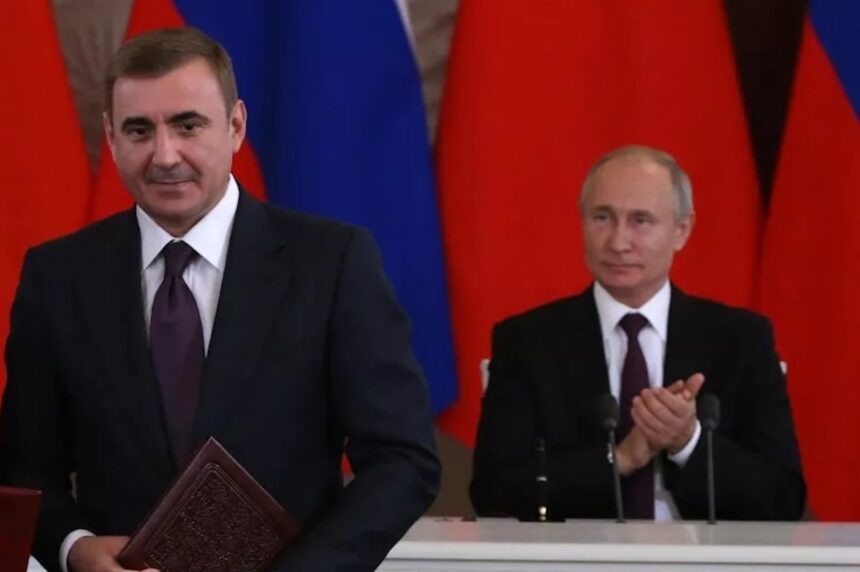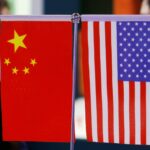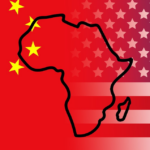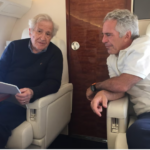The conflict has undergone a substantial change as a result of Ukraine’s recent incursion into Russia’s Kursk area, where Ukrainian soldiers have advanced deeply into Russian territory and established a base spanning over 1,000 square kilometres. The operation has inflicted a significant setback on the Russian forces, who have faced difficulties in countering the progress despite promptly deploying additional troops to the region.
President Putin has designated Alexei Dyumin, a former bodyguard and important political figure, to spearhead the “counter-terrorist” effort in response. The nomination of Dyumin, which is outside the conventional military hierarchy, signifies Putin’s waning confidence in his military commanders and has the potential to shape Dyumin’s political prospects.
Putin persistently portrays the conflict as a larger battle against Western countries, alleging that Western nations are utilizing Ukraine as a substitute to combat Russia. This statement highlights the geopolitical significance of the war, as Moscow aims to diminish Ukraine and the West while strengthening its position in any future negotiations.
However, the likelihood of Putin directly escalating military action against NATO is low, as it could lead to a larger conflict that would not benefit Russia. Conversely, Ukraine’s military actions in Kursk could improve its position in future peace negotiations, with continued support from the West being crucial in countering Russia’s strategic evaluations.
Read more below.
Ukraine’s Kursk incursion: how the invasion of Russia could change the political focus of the conflict
The Ukrainian operation in Russia’s Kursk region began in late July with several days of airstrikes before Kiev’s ground forces quickly advanced several miles deep into Russian territory on August 6, 2024.
Since then, according to various reports, they have established an expanded foothold of as much as 1,000 square kilometers. They have destroyed a lot of Russian equipment and inflicted heavy casualties on Russian forces.
The Kremlin has rushed forces to the region but has so far failed to halt the Ukrainian advance, let alone drive Ukrainian forces from Russian soil. Now, according to as yet unconfirmed but credible reports, Putin has appointed Alexei Dyumin to head up what it calls its “counter-terrorist” response to the Ukrainian incursion. This is significant in several ways.
First, there is the personnel dimension. Dyumin is Putin’s former bodyguard but also served as deputy head of the GRU military intelligence service, deputy defense minister and, until the end of May 2024, as governor of the Tula region, south of Moscow.
He was then appointed as secretary to the State Council. This is a body that brings together all the governors of Russia’s regions and is chaired by the Russian president. The choice of Dyumin—someone clearly outside the traditional military hierarchy—is indicative of Putin’s lack of trust in his military leaders to get the job done.
Dyumin’s handling of this crisis could therefore either accelerate or end his rise among the Russian political elite. If he is successful, it would potentially cement his status as a prime candidate to succeed Putin.
Putin’s phraseology, referring to Ukraine’s operation as a provocation requiring a “counter-terrorist” response, is also significant. It implies that he is still reluctant to admit that he has plunged Russia into an actual war with its neighbor.
Rather, the counter-terrorist operation now underway inside Russia sits next to what Putin has called the “special military operation” being conducted in Ukraine.
Both mask the true extent of the problem that Putin now faces. On the one hand, the Russian president has to deal with a very costly war in Ukraine. The conflict has fundamentally altered the global geopolitical landscape and left Moscow with few alternatives to an unflattering and difficult-to-manage alliance with China, Iran and North Korea.
On the other hand, it undermines further the perception of Putin’s own competence and that of his key military leaders in their ability to safeguard Russian national security. Even if they are eventually able to contain and push back the Ukrainian forces that are, for now, firmly lodged surprisingly deep inside Russia, the very fact that they could get as far as they have for as long as they did is an undeniable failure.
Blame the West
It’s also worth noting that Putin has doubled down on one of his key justifications for his war of aggression against Ukraine—that this is all the fault of the West.
Reportedly claiming “the West is fighting us with the hands of the Ukrainians”, is another indication that, for Putin, this war is about much more than Ukraine possibly joining NATO and the EU. It’s also an important guide to what can be expected from Moscow in the long term when it comes to potential negotiations with Kiev over an end to the war.What Moscow will want out of those is a weakening of Ukraine and the West and a relative strengthening of its own position, particularly when it comes to any potential future confrontation with NATO.
This will also be important for Putin domestically, including in terms of his legacy, which we know to be very important to him. Any such preferential outcome will potentially also enhance Russia’s influence in any Chinese-led alliance emerging as a counterpoint to the US and its allies.
This continued framing of the conflict as one between Russia and the West also raises the stakes for Ukraine’s Western allies, and quite significantly so. It potentially gives Russia an opportunity to claim that NATO as a whole, or individual NATO members, have become co-belligerents and are therefore legitimate targets for Russian escalation of the conflict.
The UK’s reiteration of its position that arms supplied to Ukraine can, with the exception of long-range Storm Shadow missiles, be used by Kiev in its operation in the Kursk region will no doubt be framed by Moscow as one such instance of Western powers acting as belligerents against his country.
Russia has used this argument repeatedly over the past two-and-a-half years, but it has never acted on any of its threats of escalation. It is unlikely to do so now. On the one hand, it would require Putin to acknowledge a state of war—first with Ukraine and then, by extension, with the West.
On the other hand, it would very likely trigger an Article 5 response from NATO, calling for collective defense from member states that would inevitably lead to a full-scale military confrontation.
Neither is in Putin’s interest. And the latter could not possibly achieve for Russia what Putin might hope to gain through negotiations, especially if he enters them from a position of strength.
Ukraine’s operation in the Kursk region is likely to deny the Russian president this opportunity and tilt the playing field further in favor of Kiev ahead of any future talks. For that reason alone, the current Ukrainian offensive is worth continued Western backing and calling Putin’s bluff.
By: Stefan Wolff, Professor of International Security, University of Birmingham
Source: The Conversation







